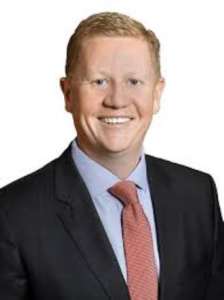
The rationale behind the buy, not build for one vendor’s cloud
Dave Turner, president, CEO and chairman of the board of Hitachi Vantara Federal, said vendors too often are asking questions instead of doing research to find out...
Views from the Corner Office is designed to talk to the private sector leaders that influence and impact the federal market. The goal of this monthly discussion is for federal executives, lawmakers and other industry experts to gain insights and a better understanding into the trends, the challenges and the evaluation of the technology, acquisition and leadership in the federal market by the executives who lead the federal practices of government contractors.
Dave Turner, president, CEO and chairman of the board of Hitachi Vantara Federal, sat down with Federal News Network’s executive editor Jason Miller at his offices in Reston, Virginia.
Here are some excerpts from that discussion.
State of the federal market
JM: Is it a good time to be a federal contractor?
DT: I think the federal market is certainly strong when you look at the earnings reports that folks are submitting. But there’s also the intangibles. One of the things that I like to talk about is, as you know folks that aren’t in this market don’t necessarily understand the nuances, as you look around and you see the cranes, you see all the investment that’s going on in the District of Columbia, Maryland and Virginia. I think that is a great sign for what’s going on in the market. You know government contractors are building new headquarters. They’re investing and you’re also getting that ancillary investment. Amazon headquarters two is a great example, right? That announcement that they’re coming to the region to me shows that the market is very healthy and it serves as that foundation for what’s going on in the region.

JM: Why is construction a sign for you?
DT: That is a true long-term investment. You can hire people that might not be on contract tomorrow but if companies are willing to make that capital investment in these longer term things that really is a sign that the market as a whole, it believes that this is sustainable and not just a one-time thing.
School never ends
JM: A lot of vendors talk about doing their homework, but what does that mean for you?
DT: You never want to lead with the question of ‘how can I help you?’ in my experience because you haven’t done your homework. They get that question every single day. We like to take the approach of doing our homework and then going in with a ‘hey, we know you have this problem.’ And in some instances, they didn’t even know they have the problem, but to go in and present them with a solution that can address that problem. But folks that open with what keeps you up at night, it’s probably not a great strategy.
JM: How do you do your homework now?
DT: We do a lot of our homework because we’ve got folks that we’ve assigned to accounts that we don’t yet have work at. We hire folks that have a service in some of those areas, so they understand the mission of that. We’ve got a lot of veterans and former government employees that understand the mission. They grew up there. For our current customers, we invest in making sure that we spend time with them, not just selling things, but understanding what they’re trying to do next. Helping them with technology roadmaps, helping them look at various different options, really to try and be that honest broker, to give them some options moving forward for some of the problems that we know.
Buying a [Rean] cloud
JM: Are mergers and acquisitions a good thing for the federal market?
DT: I think you have faith in the market and that the market is going to drive business health. So I think that the M&A piece is good for the market. The key really is, why are you buying the company? Are you buying it for scale or are you buying it for penetration into a new customer set? Or are you buying it for the skilled staff? Are you buying it for the technology piece? If you don’t have that worked out a beforehand and then during the integration, sometimes you don’t necessarily see the results that you might want.
JM: What do you look for when buying another company?
DT: Given Hitachi’s overall size, we’re not necessarily looking for the simple scale. We’re really looking for the technology pieces that will help us knit together an entire solution. Take the Rean cloud acquisition as an example. Our strategy was to be able to be a credible end-to-end data services provider. In other words, we don’t care where our customers want to keep their data, that’s going to change over time. We want to be that end-to-end data services provider, be it on-premise, in a hybrid or in the cloud. And so for us, that was a really a core capability that we did not have. The cloud piece is moving so fast that we felt it prudent to buy it rather than build it. It would’ve taken us several years to get there. And given the pace at which these things are advancing, it’s hard to build a target that’s moving that fast.
A TSA Pre-Check for security clearances
JM: About two thirds of your work is in the Defense and intelligence world, so that’s probably a lot of security clearances that you need your staff to have. How big of a challenge is the security clearance process?
DT: We’ve got the geography piece because we have folks all over the country, doing government projects. So you’ve got the geography, you’ve got the technology skill set and the clearance piece. We deal with some pretty high-end technologies that are not necessarily easy to pick up on, but we actually find sometimes it’s easier to get folks trained up on the technologies than it is to reliably get them through the clearance process. We’ve actually taken the approach recently where we’re hiring folks with the clearances that we need and then investing in the training because it’s something that we can control. If we can put a little bit more time, effort, energy, be more innovative, sometimes we can speed up that training cycle and it is within our control. Whereas the clearance process is in some in other folks’ hands.
JM: If you could change or improve the security clearance process, what would you like to see done?
DT: One of the things that we’ve talked about internally and I’ve heard some folks talk about is almost a PrePass like you see from TSA. Almost a pre-certification for folks. But that is a slippery slope and you are dealing with information that can’t get out. And given the threats that we’ve got, you might want to consider it, but I certainly wouldn’t want to be the one to sponsor it.
Molecular biologist by training
JM: Tell us one thing about you outside of work that most people don’t know.
DT: I started off doing research science. I graduated from the University of Michigan with a degree in molecular biology and started my dream job doing research science at the University of Pittsburgh Medical Center, writing papers about inducible nitric oxide synthase and its effect on rat brains that had received trauma. A little bit different than government contracting. I went to go into graduate school at the University of Pittsburgh and again was not going to do government contracting. I was going to do telecommunications. I was all in on doing telecommunication cell phones, which were just getting big and I was going to do telecommunications consulting. I got hired by American Management Systems and exactly two days into the job their telecommunications practice had quite a bit of trouble. I got interviewed by the head of one of the government sector folks there and they said, we have a fantastic opportunity. Have you heard about the personal responsibility and Work Opportunity Reconciliation Act? And I of course said no, but that was welfare reform. So welfare reform took me to the state of Ohio and I had an opportunity to work with the public sector folks there and fashion their whole automation around welfare reform. So I got to tell you though, for two or three years into that gig, I still didn’t want to be there. At that time, who the heck wants to be in government contracting? But it ended up being one of those very fortunate forks in the road and obviously now I’m really glad I’m here.
Copyright © 2024 Federal News Network. All rights reserved. This website is not intended for users located within the European Economic Area.
Jason Miller is executive editor of Federal News Network and directs news coverage on the people, policy and programs of the federal government.
Follow @jmillerWFED
Related Stories





